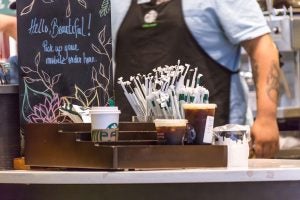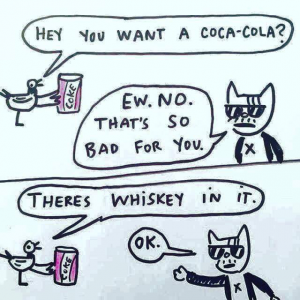I wrote this tweet a couple of months back and it was quite a popular one:

Ahh, Facebook Karen. The internet’s fictional character comparable to the expression of “that guy.” We all have that one friend … that one “Karen” or “that guy” who has to be the Debbie downer of the group, point out the obvious, whine and complain too often … you know. The one who’s always a blast at parties. <Sarcasm>
Anyway, the tweet made me chuckle. It’s true though. There is so much media attention to eat less meat, reduce plastic straws, end food waste and hunger, etc.
Some of these are admirable goals. I don’t think anyone could say that food waste or food insecurity is a good thing. Some people will never give up their plastic straws. And the “livestock are destroying the planet” messages are continually debunked.
So why does the the alcohol industry get such a pass? How about coffee and society’s Starbucks obsession?
If you think about it, the answer is quite simple. There’s really no major “anti-alcohol” or “anti-coffee” lobby groups or food company competitors to infiltrate and profit off of the media.

Are livestock destroying the planet? According to science, not really. According to beef’s well-funded competitors like Beyond Meat, Impossible Foods, or vegan anti-animal agriculture groups, definitely. But these groups continually misrepresent the facts and have an agenda. Follow the money. The more they make people believe livestock are wrecking havoc, the more donations they can secure and the more alternative meat burgers they can sell.
Their sales and marketing tactics tend to be quite slimy and unethical, very similar to certain organic and non-GMO food brands. The amount of times I’ve seen the anti-GMO crowd say “GMOs are poison” are countless — yet also completely unfounded with no solid science-based evidence to back those claims. GMOs are proven safe and effective by pretty much every major food safety authority in the world.
On the contrary, alcoholic beverages can legitimately be poison, and alcohol production uses billions of tons of grain and water all around the world. Glass, plastic, aluminum, trucking around the globe, you name it. Resource central, but no one seems to mind. They’re too busy bragging about their imported Italian wines, German biers, and the finest Japanese Sake. I won’t claim to be an expert on the statistics behind alcohol’s carbon footprint, but this link shows per capita alcohol consumption and other facts. It’s quite interesting! (Especially if you’re European or Aussie, haha.)
Don’t get me wrong, I drink and enjoy alcohol. A couple of days a week I also love a good cup of a naturally occurring pesticide and class 1 carcinogen better known as coffee. This article isn’t meant to throw these industries under the bus, (seriously, don’t come between Facebook Karen and her wine) but rather point out the hypocrisy of society. The meat industry and GMOs are accused of being bad, but alcohol and coffee are totally fine? Because the competitors of these beverage companies are not yet slimy enough to say, “Alcohol and coffee are horrific and destroying the planet, you better switch to soda.”

And that’s one of the major points here, that “fear” is the new “sex” when it comes to selling something. The sales tactics of vegan “meat” brands and the anti-GMO crowd have swayed public opinion that you’re a horrible person to the environment unless you go vegan and organic. It’s a way for some people to feel morally superior (albeit, they’re probably not) in the same way they drink a double shot non-fat no whip skinny vanilla latte for $6 at Starbucks every morning with their five kids in an SUV.
Don’t get me wrong … it’s always a good idea to try to reduce our carbon footprint. But do that in a way based on scientific evidence and what makes you feel most comfortable, not because powerful lobbying groups have changed the for-profit environmental narrative. Now if you’ll excuse me, I’m off to have dinner consisting of locally grown in season vegetables, beef produced in our backyard, and wine from a small local Iowa vineyard.
Does this make me a better environmentalist?
Perhaps. It’s complicated.
Michelle Miller, the Farm Babe, is an Iowa-based farmer, public speaker, and writer, who lives and works with her boyfriend on their farm, which consists of row crops, beef cattle, and sheep. She believes education is key in bridging the gap between farmers and consumers.



